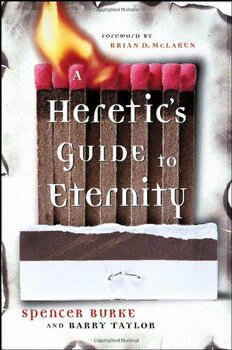
A Heretic's Guide to Eternity PDF
294 Pages·2006·3.578 MB·German
Most books are stored in the elastic cloud where traffic is expensive. For this reason, we have a limit on daily download.
Preview A Heretic's Guide to Eternity
Description:
I have a friend who likes to "stir the pot". If there is a controversial side to an issue, he'll take it. If there are questions to be asked or alternate points of view to consider, he'll ask them and find them. He's something of an instigator, though to those he's questioning or instigating he's seen as more of a troublemaker. I'm not sure why he can't "just let things be". I don't know why he keeps upsetting the apple cart, maybe it is his personality, his disposition, or his spiritual gift. Spencer Burke and Barry Taylor do much the same in A Heretic's Guide to Eternity. The work is keen on instigation and thus, for those in Religious power-centers, full of troublemaking heresies.
Burke and Taylor, though it seems that Burke's voice is dominant - either by the convention of writing or in actual fact, begin by setting the cultural and philosophical stage. The Enlightenment brought about the age of science and reason. It also ushered in the rise of secularism whereby religion, spirituality, and mystery were vanquished to the realm of private or non-existent. "Secularism's partner, technology, pitched the assurance of a better future and the guarantee of unending progress" (xix). However, it is clear that this dream has ended. In recent years there has been a marked rise of interest in things spiritual or mysterious. "God is coming back into the picture in new and different ways" (xxiii). It appears that the institutions that held sway in the modern era are either in decline or irrelevant to our current cultural situation. "As with government, many people no longer count on religion to deliver on its promises and provide meaning and motivation" (xxii). Note: to this reviewer it is worth noting that Burke's and Taylor's cultural analysis is not dissimilar from a myriad of books, websites, and sermons. In a word, they've said nothing new. It would seem that they have two paths they could take. On the one hand, they could suggest "X" (insert your favorite number here) ways of reinvigorating religion. On the other, they could envision a path beyond religion all together. They chose the second and spend the remainder of the book explaining why.
"Spirituality in the twenty-first century is not etched in stone but fashioned out of the fabrics of our lives in new and ever-changing permutations. This is the focus and hope of this book" (xxiv). In many ways, the book is an amalgam of thoughts arranged more or less in a readable order. Stylistically it is not unlike the remixed spirituality that the authors are advocating. In many ways reading A Heretic's Guide is like reading a collection of blog posts around a general theme of remixed spirituality visa-a-vi tired old-time religion. In fact, it seems that Burke and Taylor have never met a provocative spiritual idea that they didn't like. The reading experience was similar to reading a RSS (Really Simple Syndication) aggregator of blog posts and news feeds.
As to an assessment of the dichotomy played out in contrasting religion vs. spirituality, I must admit that I left the book feeling less than convinced. I believe they are essentially correct in their diagnosis of religions shortcomings in our global information age. The democratization of information and proliferation of technology has forever changed the fabric of our world. We most certainly need a new vision for what it means to be a person and a people of faith. A Heretic's Guide may provide stepping stones for that new vision, it may be the first glimmers of light before the dawn of a new day, but it does not go far enough. Mind you, I do not think the authors intend that it does. I suspect they are well aware of emergent nature of the things they are presenting. But the shortcoming I do see is that religion becomes something of a straw-man to get knocked down by ambiguous and all-pervasive "spirituality". But what happens when a group of people chose to live out a particular spirituality together? At what point does a corporate spirituality - organized and practiced in a local community - become "religion"? Obviously religion as it has been known has changed and will continue to do so. And I'm not advocating for tinkering with our religion to make it more relevant or palpable to a disinterested public. But to create such a polemic between religion and spirituality seems to do disservice to both.
In summary, I believe that Heretic's is an intentionally provocative book and, for those who can stomach such agitation, it will probably serve as a helpful resource. But its helpfulness is mostly confined to deconstruction rather than reconstruction for a future faith.
See more
The list of books you might like
Most books are stored in the elastic cloud where traffic is expensive. For this reason, we have a limit on daily download.
